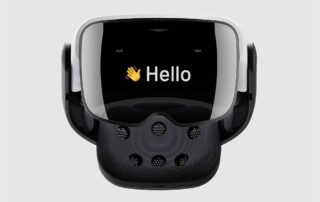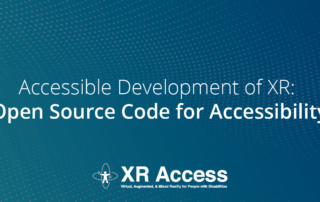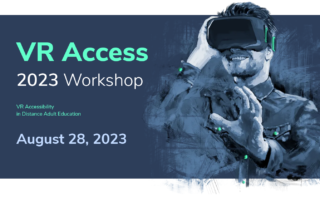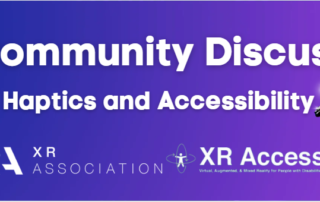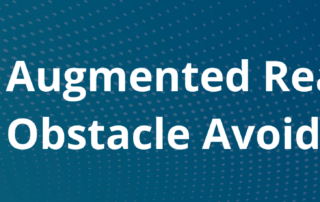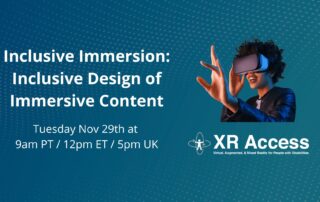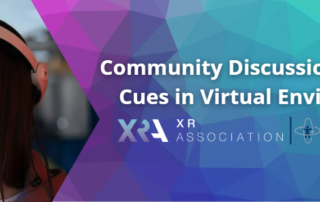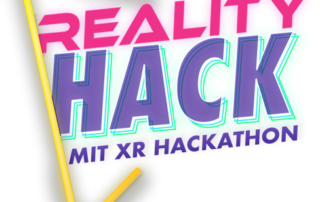Events

2025 XR Access Symposium
The 2025 XR Access Symposium will be happening June 26-27 in New York City, with the theme “3D Diversity.” Don’t miss out on this historic conference!
Upcoming Events
Past Events
Designing for Assisted Reality + BCI
July 28th
On July 28th at 12pm PT/3pm ET, Sandra Feng and Cole Heiner of Cognixion presented on groundbreaking design work using assistive reality and brain-computer interfaces to advance face-to-face communication solutions for persons with Cerebral Palsy, ALS and Locked-in Syndrome.
Accessible Development of XR: Open Source Presentations
July 18, 2023
On July 18th, 2023, our XR Open Source Fellows Savio Menifer, Shivam Sharma, and Yuvraj Kadale presented their code and prototypes for accessible captions, locomotion, and display settings respectively, made in collaboration with Equal Entry.
Continue Reading Accessible Development of XR: Open Source Presentations
Workshop on VR Accessibility in Distance Adult Education
August 28th, 2023
As virtual reality (VR) technology becomes more pervasive, it continues to find multiple new uses
beyond research laboratories. One of them is distance adult education—the potential of VR to
provide valuable education experiences is massive, despite the current barriers to its widespread
application. Nevertheless, recent trends demonstrate clearly that VR is on the rise in education
settings, and VR-only courses are becoming more popular across the globe. This trend will continue
as more affordable VR solutions are released commercially, increasing the number of education
institutions that benefit from the technology. No accessibility guidelines exist at present that are
created specifically for the implementation of specific accessibility features for VR hardware and
software in distance education. The purpose of this workshop is to address this niche and formulate
a set of practical guidelines and its implementations for the use of VR in distance adult education to
make it accessible to a wider range of people.
To make it happen we would like to invite researchers and practitioners who represent the fields of
distance education, virtual reality, and accessibility, as well as those with combined experience in
these areas. We encourage people that are interested in new forms of distance education to join our
debate on the opportunities and challenges of the application of VR in their fields—even if they lack
prior experience with the technology.
Continue Reading Workshop on VR Accessibility in Distance Adult Education
Community Discussion on Haptics and Accessibility
February 28, 2023
The XR Community Discussion on Haptics took place on February 28th at 11am PT / 2pm ET and featured presentations from leading industry figures Bob Crockett, Ashley Huffman, and Dhruv Jain, followed by an open audience discussion of best practices for addressing how haptics can help XR utilize the sense of touch for immersion and accessibility.
Continue Reading Community Discussion on Haptics and Accessibility
Augmented Reality Obstacle Avoidance | Dylan Fox
January 31, 2023
How can augmented reality amplify vision to support obstacle navigation for people with limited sight? Join UC Berkeley researcher and XR Access Head of Community and Outreach Dylan Fox to learn about Augmented Reality Obstacle Avoidance. This research project showcases the opportunities and challenges faced in leveraging AR as an assistive technology, such as using digital cues to improve the contrast of physical obstacles and pointing out hazards that users might miss. With AR devices growing ever more popular, this work hints at how they may follow the smartphone in becoming powerhouses of accessible technology.
Continue Reading Augmented Reality Obstacle Avoidance | Dylan Fox
Inclusive Immersion: Inclusive Design of Immersive Content
November 29th, 2022
Continue Reading Inclusive Immersion: Inclusive Design of Immersive Content
Community Discussion on Audio Cues in Virtual Environments
September 22, 2022
As we continue to explore bringing accessibility to XR technology, we identified the need to examine audio cues in immersive environments. XRA and XR Access partnered to host a 90-minute session comprised of industry experts and the public to identify if lessons learned in the application of audio cues in 2D games can be applied to immersive experiences to benefit the blind and low vision communities. Nearly 70 people registered for the event, and we were joined by three featured speakers to probe into the topic. A recording of the session can be viewed here. Notes from the session, including helpful resources, relevant links, discussion topics, and transcripts, can all be found here.Continue Reading Community Discussion on Audio Cues in Virtual Environments
Accessible XR Summer Research Program | Final Presentations
August 5, 2022
Each summer, Cornell Tech and Columbia University welcome undergraduates from across the country to their campuses for a NSF-funded Research Experiences for Undergraduates program in accessible XR.
This year, eight students spent the summer learning research methods, building prototypes, and testing new ideas for projects that make XR more accessible to people with disabilities.
You’re invited to view final presentations from the REU project groups on Friday, August 5th at 1pm ET. Students will provide background on their projects and demonstrate the technologies they’ve created. Please join us in congratulating our hard-working students on their successes during this program!
Register for the presentations here >Continue Reading Accessible XR Summer Research Program | Final Presentations
Inclusive User Testing in VR @ MIT Reality Hack
August 9, 2022
Completed as part of the MIT 2022 Reality Hack, “Inclusive User Testing in VR” is an accessible in-game tool that allows general audiences to give feedback on VR projects. Users can use a variety of input methods, including voice-to-text and VR keyboards, and also includes screen reader support for low-vision individuals. This functionality allows researchers, developers, and designers to receive immediate, asynchronous feedback on their VR projects via a web-based dashboard. In this talk, we will cover not only the value that this tool brings to a diverse number of XR creators, but how this hackathon project went from an initial concept to a usable tool over the course of many development iterations and direct involvement from the accessibility community. Register for the talk here.Continue Reading Inclusive User Testing in VR @ MIT Reality Hack
Inclusion and Accessibility in XR: Exploring Experiences | Reginé Gilbert
July 19, 2022
This talk will review what inclusion and accessibility mean for extended reality and the metaverse. By examining existing heuristics and researching existing methods for accessibility, the discovery has been made that new principles need to be adopted to create more equitable experiences. We will discuss ongoing research on accessible augmented reality. Register for the talk here.Continue Reading Inclusion and Accessibility in XR: Exploring Experiences | Reginé Gilbert
